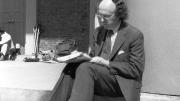For more than half a century, two-time Pulitzer Prize winner Anthony Lewis ’48, NF ’57, served as an astute watchdog of the United States Supreme Court, the First Amendment, and the role the press plays in American government. Lewis, who was a columnist for The New York Times for 32 years, died early this morning, reports The Boston Globe. He was 85.
Regarded by many as one of the great American journalists of the post-World War II era, Lewis, an expert on constitutional law, first won the Pulitzer for national reporting for The Washington Daily News in 1955—during the period of McCarthyism—for a series of articles on the dismissal of a navy employee as a security risk. (The articles led to the employee’s reinstatement.) He won a second Pulitzer Prize in 1963 for The New York Times (their obituary appears here) for his coverage of the Supreme Court.
“A final argument for broad freedom of expression is its effect on the character of individuals in a society,” Lewis wrote in his 2007 book, Freedom for the Thought That We Hate: A Biography of the First Amendment. “Citizens in a free society must have courage—the courage to hear not only unwelcome political speech but novel and shocking ideas in science and the arts.” (The issue had stirred him for many years; he touched on the matter in a 1953 letter to this magazine.) His other books include Gideon’s Trumpet (1964), about a Supreme Court case giving impoverished criminal defendants the right to an attorney; Portrait of a Decade (1971), about changes in American race relations; and Make No Law (1991), about New York Times Co. v. Sullivan—the landmark Supreme Court decision that changed the course of First Amendment litigation in America.
“I think the Supreme Court is a very great and essential institution for this country,” Lewis told a reporter at George Mason University in 2012. “I believe that if we hadn’t had a Supreme Court and its power written into the Constitution, we would have long since fallen apart as a country because regional and other differences would have been too great to have withstood divisive impacts.”
The author of the column “At Home Abroad”/“Abroad at Home” (depending on his location) for the Times from 1969 to 2001, Lewis also served as the paper’s London bureau chief from 1964 to 1969. “In the end I believe that faith in reason will prevail,” he wrote in his last column for the Times in 2001. “But it will not happen automatically. Freedom under law is hard work. If rulers cannot be trusted with arbitrary power, it is up to citizens to raise their voices at injustice. The most important office in a democracy, Justice Louis Brandeis said, is the office of citizen.”
Lewis was a managing editor of The Harvard Crimson and an Undergraduate columnist for this magazine (later serving on the board of directors) before going to work for the Sunday department of the Times. In 1952, he became a general assignment reporter for The Washington Daily News, and from 1956 to 1957 was a Nieman Fellow at Harvard, studying law. In the following years he reported on the Warren Court and the federal government’s responses to the civil-rights movement. He lectured at Harvard Law School from 1974 to 1989 and taught at Columbia’s Graduate School of Journalism for more than 30 years; when he announced his Columbia retirement several years ago, he told The Record, “I love students and I think teaching is the most wonderful profession, even more than journalism. Your students become your future.”
When he was awarded the Presidential Citizens Medal in 2001, the citation said Lewis “has set the highest standard of journalistic ethics and excellence” and called him a “staunch defender of freedom of speech, individual rights, and the rule of law.”
Lewis leaves his wife, Margaret H. Marshall, Ed.M. ’69, the twenty-fourth chief justice of the Massachusetts Supreme Judicial Court (now retired; she is also an incorporator of this magazine), and three children by a first marriage. The funeral will be private, but the Globe reports that a memorial service is expected to be held later.









